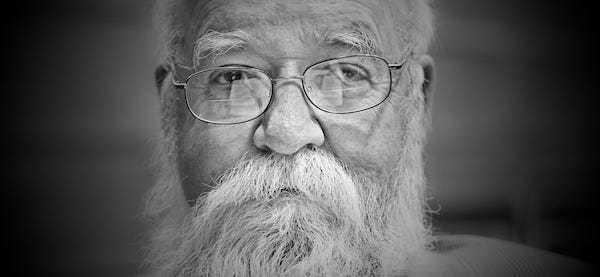A couple of days ago Dan Dennett passed away. He was one of the most influential philosophers of the 20th and early 21st century, an original thinker, and certainly someone who didn’t shy from controversy.
I met Dan many years ago, and though we didn’t necessarily see eye to eye on evolution (he was a harsh critic of evolutionary biologist Stephen Jay Gould, I wasn’t), he was never anything but kind to me. Indeed, he agreed to write one of the letters of support that got me my first job as a philosopher at the City University of New York, thus allowing me to complete the switch from biology to philosophy that I had begun a few years earlier.
One of my best memories of him is from a long evening we spent together (and with physicist Lawrence Krauss) in Ghent, Belgium, on 17 October 2013. The event was organized by my friend Maarten Boudry, with whom I co-authored a number of technical papers and co-edited two books.
At dinner before the event Dan had been very pleasant to the rest of us, behaving like a benign uncle. The event itself promised to be highly informative and entertaining.
As you can see from the video (below) the stage was set with a lot of alcohol available to the panelists. The result, predictably, was an increasingly freewheeling and enjoyable discussion, and a good time was had by everyone. You can watch the event here:
Dan’s obituary in the New York Times was only partly complimentary, which surprised the hell out of me. For instance:
An outspoken atheist, he at times seemed to denigrate religion. “There’s simply no polite way to tell people they’ve dedicated their lives to an illusion,” he said in a 2013 interview with The New York Times.
Well, if intellectual integrity is “denigrating” then so be it, I guess. Also:
While Mr. Dennett never held back in contradicting the views of other scholars, he bristled at harsh comments about his own work.
Indeed, if by “bristling” one means responding in rhyme to accusations of intolerance. A reviewer of the 2006 best-seller “Breaking the Spell: Religion as a Natural Phenomenon,” Leon Wieseltier, wrote that “Dennett is the sort of rationalist who gives reason a bad name.” No he wasn’t, and you can read his full exchange with Wieseltier here in order to make up your own mind.
Dan famously proposed four rules for arguing with kindness, which he actually practiced:
Attempt to re-express your target’s position so clearly, vividly and fairly that your target says: “Thanks, I wish I’d thought of putting it that way.”
List any points of agreement (especially if they are not matters of general or widespread agreement).
Mention anything you have learned from your target.
Only then are you permitted to say so much as a word of rebuttal or criticism.
I haven’t been that good myself, but I’ve been working toward that ideal!
Here is an illuminating interviews with Dan, again in the New York Times, published on the occasion of the publication of his memoir, “I’ve been thinking.” Again, the times couldn’t stop itself from being uncomplimentary, calling Dan “an éminence grise of American philosophy.” Oh well.
One of my favorite books by Dan is Intuition Pumps And Other Tools for Thinking, which is truly a useful guide to improve the way we reason, something that our society could most certainly benefit from. But the one that changed my entire way of thinking about mind and the perennial issue of free will is one of his early ones, Elbow Room: The Varieties of Free Will Worth Wanting, where he explains as clearly as anyone has ever done before or since, why “free” will is not a thing, but “will” is.
As an evolutionary biologist I was not too enamored of what is arguably Dan’s most famous book, Darwin's Dangerous Idea: Evolution and the Meanings of Life. Contra Dan (and Richard Dawkins), I don’t think Darwinism is a “universal acid” that cuts through everything. It’s not an ideology, it’s a scientific theory, and it doesn’t apply everywhere, but only to certain specific physical systems, known as “living.” Nevertheless, this is still today a book very much worth reading.
I’ll leave you with Dan’s own words:
“If you can approach the world's complexities, both its glories and its horrors, with an attitude of humble curiosity, acknowledging that however deeply you have seen, you have only scratched the surface, you will find worlds within worlds, beauties you could not heretofore imagine, and your own mundane preoccupations will shrink to proper size, not all that important in the greater scheme of things.” ― Breaking the Spell
_____
P.S.: Thanks to one of my readers, Maurits Pino, for suggesting this special edition of Figs in Winter.





I did like "Darwin's Dangerous Idea". Maybe I should reread it.
It seems I definitely should read "Intuition Pumps...". The 4 rules for arguing with kindness look like something I should aspire to as well.
Thanks for posting this Massimo. What a challenge it is to argue well by using Dennett's four suggestions. We are fortunate that his work leaves a lasting legacy to guide us in thinking well.